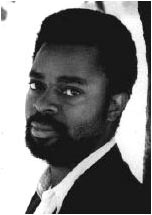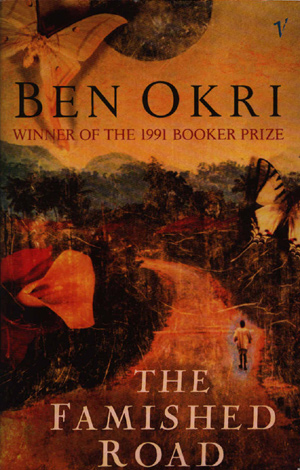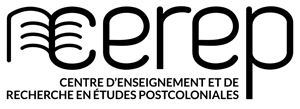 Ben Okri was born on 15 March 1959 in Minna, Nigeria, to an Igbo mother, Grace, and an Urhobo father, Silver. Okri's father, then a railway station clerk, soon left for England to study law. The rest of the family joined him shortly afterwards. Despite young Ben's protestations, the Okris returned to Lagos in 1965, where Silver Okri set up a law practice.
Ben Okri was born on 15 March 1959 in Minna, Nigeria, to an Igbo mother, Grace, and an Urhobo father, Silver. Okri's father, then a railway station clerk, soon left for England to study law. The rest of the family joined him shortly afterwards. Despite young Ben's protestations, the Okris returned to Lagos in 1965, where Silver Okri set up a law practice.
While Ben Okri seldom reveals details about his childhood (unless perhaps his early memories of the Civil War), saying he'd "rather reserve that for the complex manipulations of memory that only fiction can provide" (Wilkinson 1992:77), he has extensively commented on his literary influences. They range from the African tales and legends his parents used to tell him to the European authors whose works he found in his father's library: Aristotle, Plato, Shakespeare, Dickens, Twain, Ibsen, Chekhov and Maupassant, among others. This double heritage, the intermingling of African myths and European sources, and the later influence of contemporary African writers, were to become major inspirations for Ben Okri's work.
Okri began writing articles and fiction in 1976, after failing to get a place at a university in Nigeria. He wrote a play and a novel while working in a paint company, and then moved to England, first to study comparative literature at the University of Essex, then to continue writing in London. His first novel, Flowers and Shadows, was published by Longman in 1980, and features a teenager's disillusionment with Nigeria's corrupt society, which, as he discovers, his own father is a part of. The story is, Okri insists, "not autobiographical at all" (Wilkinson 1992:79); unlike, perhaps, The Landscapes Within (1981), whose main character, Omovo, is a young painter living in Lagos. This novel, which Okri was later to re-write under the title Dangerous Love (1996), may be considered an early artistic manifesto, for Omovo's approach to art seems in many ways to reflect the author's views on language and creation, as expressed later in the collection of essays A Way of Being Free (1997).
 The Landscapes Within, as well as some of the short stories contained in Incidents at the Shrine (1986) and Stars of the New Curfew (1988), read as tales of a country, Nigeria, struggling with poverty, corruption, and sometimes war. These thematic interests were further developed in The Famished Road (1991), for which Okri won the Booker Prize. Based on the Yoruba myth of the abiku (the spirit-child who is born, dies and is reincarnated endlessly), the novel is told from the perspective of Azaro, a spirit-child who has decided to stay on earth. Throughout the book, the constant interaction between "reality" and the spirit world reminds one of African folktales as well as twentieth-century narratives inspired by the oral tradition, such as Amos Tutuola's. Ultimately, the myth of the abiku, who is infinitely dying and reborn, is intended as a symbol for the Nigerian nation. In 1993, The Famished Road was followed by a sequel (a "continuation of the dream", as Okri puts it [Mitchell 1994]), Songs of Enchantment; the abiku trilogy was later completed by Infinite Riches (1998).
The Landscapes Within, as well as some of the short stories contained in Incidents at the Shrine (1986) and Stars of the New Curfew (1988), read as tales of a country, Nigeria, struggling with poverty, corruption, and sometimes war. These thematic interests were further developed in The Famished Road (1991), for which Okri won the Booker Prize. Based on the Yoruba myth of the abiku (the spirit-child who is born, dies and is reincarnated endlessly), the novel is told from the perspective of Azaro, a spirit-child who has decided to stay on earth. Throughout the book, the constant interaction between "reality" and the spirit world reminds one of African folktales as well as twentieth-century narratives inspired by the oral tradition, such as Amos Tutuola's. Ultimately, the myth of the abiku, who is infinitely dying and reborn, is intended as a symbol for the Nigerian nation. In 1993, The Famished Road was followed by a sequel (a "continuation of the dream", as Okri puts it [Mitchell 1994]), Songs of Enchantment; the abiku trilogy was later completed by Infinite Riches (1998).
In his 2002 novel In Arcadia, Okri turns to a European myth and describes a film crew's journey from England to Arcadia. Once again, art, if only through the multiple references to Poussin's Les Bergers d'Arcadie, figures as a central motif that allows the novelist to explore profound themes such as man's everlasting quest for happiness. The key role played by art and the imagination in the understanding and reshaping of the world is also explored in Starbook (2007), a fairytale-like allegory set in Africa during the early days of the transatlantic slave trade, and in Tales of Freedom (2009), a book that includes hybrid tales - which Okri calls "stokus" - combining features of the short story and the haiku.
- 'Ben Okri', Interview by Edward Blishen, ICA Guardian Conversations, 1988. Video file.
- Fraser, Robert, 'Ben Okri (1959 - )', Literary Encyclopedia, 30 March 2011.
- Mathys, Kathy, 'Ben Okri: "Shakespeare is voor mij een Afrikaans schrijver"', Standaard: Letteren, 25 September 2003, pp. 8-9.
- Mitchell, Elizabeth, 'And the Road Goes on Forever', 1994. [no longer online]
- Moh, Felicia Oka, Ben Okri: An Introduction to his Early Fiction (Enugu: Fourth Dimension Publishers, 2001).
- Wilkinson, Jane, 'Ben Okri', Talking with African Writers (London & Porthsmouth: James Currey & Heinemann, 1992), pp. 76-89.

|
Page hosted by the University of Liège
|

|
